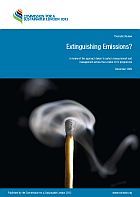
From:
Year:
Status:
Owner:
Recommendation
The residual footprint should be mitigated using a variety of techniques: Using the legacy of knowledge to reduce carbon in future projects. For example, application of BS8901 for future events, and development of a new standard for managing embodied emissions in construction projects. If this initiative were to be started promptly by Government, it would be possible to launch a new standard to coincide with the Games.
History
Status at 31 Mar 2013
Complete
The ODA and LOCOG both contributed a significant number of sustainability-related publications to the Learning Legacy website, which is now hosted by Government. These to seek to share their lessons and help to change behaviour in the construction and events industries. Uptake of ISO 20121 - the specification for a sustainable event management system which was in part inspired by London 2012 - is growing. A Government legacy statement in December 2010 included the commitment to adopt the ODA procurement standards across Government procurement but this is still to be seen. A new standard for managing embodied emissions in construction projects has not been developed but a standard for responsible sourcing of construction materials, BES 6001, has. In addition, the consultancy who developed the carbon footprint methodology for London 2012 is working with BSI on a new standard for carbon footprinting world class events. Complete
Status at 01 Oct 2012
Progress Made
Status at 31 Mar 2012
Progress Made
The Olympic Board and OBSG considered the carbon footprint and determined that mitigation would be through a combination of legacy learning - particularly in the construction and events industries - and public behavioural change campaigns. The ODA has now launched its lessons learnt programme to seek to change behaviour in the construction industry and LOCOG is encouraging the uptake of BS8901 and the creation of a new international standard ISO 20121. The Government legacy statement in December 2010 included the commitment to adopt the ODA procurement standards across Government procurement. The wider implementation and measurement of these methods by industry is still to be seen and will be reviewed by the Commission after the Games. Progress Made
Status at 31 Dec 2011
Progress Made
Status at 30 Sep 2011
Progress Made
Status at 30 Jun 2011
Progress Made
Status at 31 Dec 2010
Progress Made
The Olympic Board and OBSG considered the carbon footprint and determined that mitigation would be through a combination of legacy learning - particularly in the construction and events industries - and behavioural change such as via the EDF Energy campaign The ODA is capturing its lessons learnt and LOCOG is encouraging the uptake of BS8901. The Government legacy statement in December 2010 included the commitment to adopt the ODA procurement standards across Government procurement. The wider implementation and measurement of these methods by industry is still to be seen. Progress Made
Status at 30 Sep 2010
Progress Made
Status at 30 Jun 2010
Progress Made
Status at 31 Dec 2009
This review was published in December 2009 so it was too early to report on progress in the 2009 Annual Review. A statement on progress will be provided in the 2010 Annual Review.